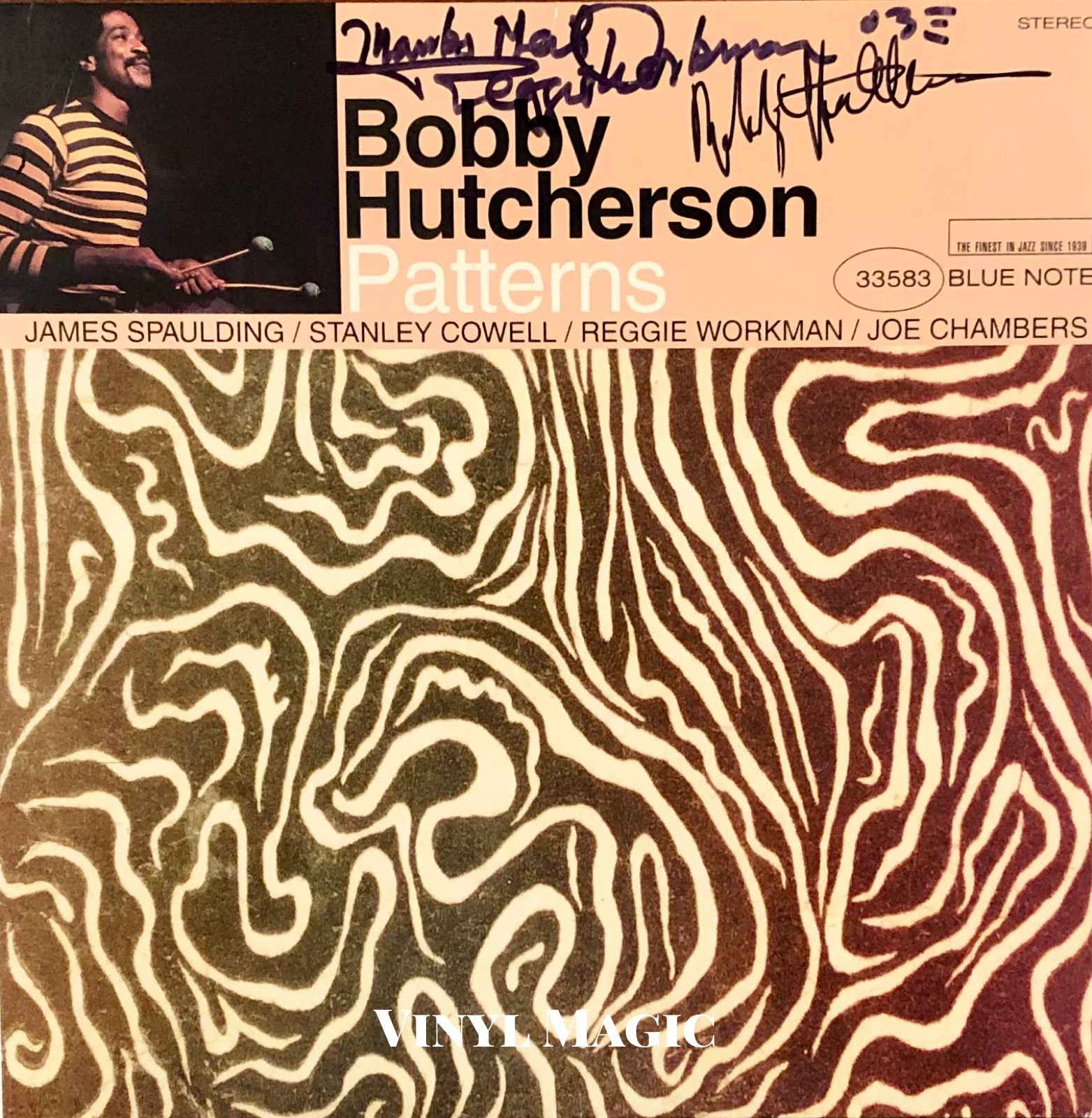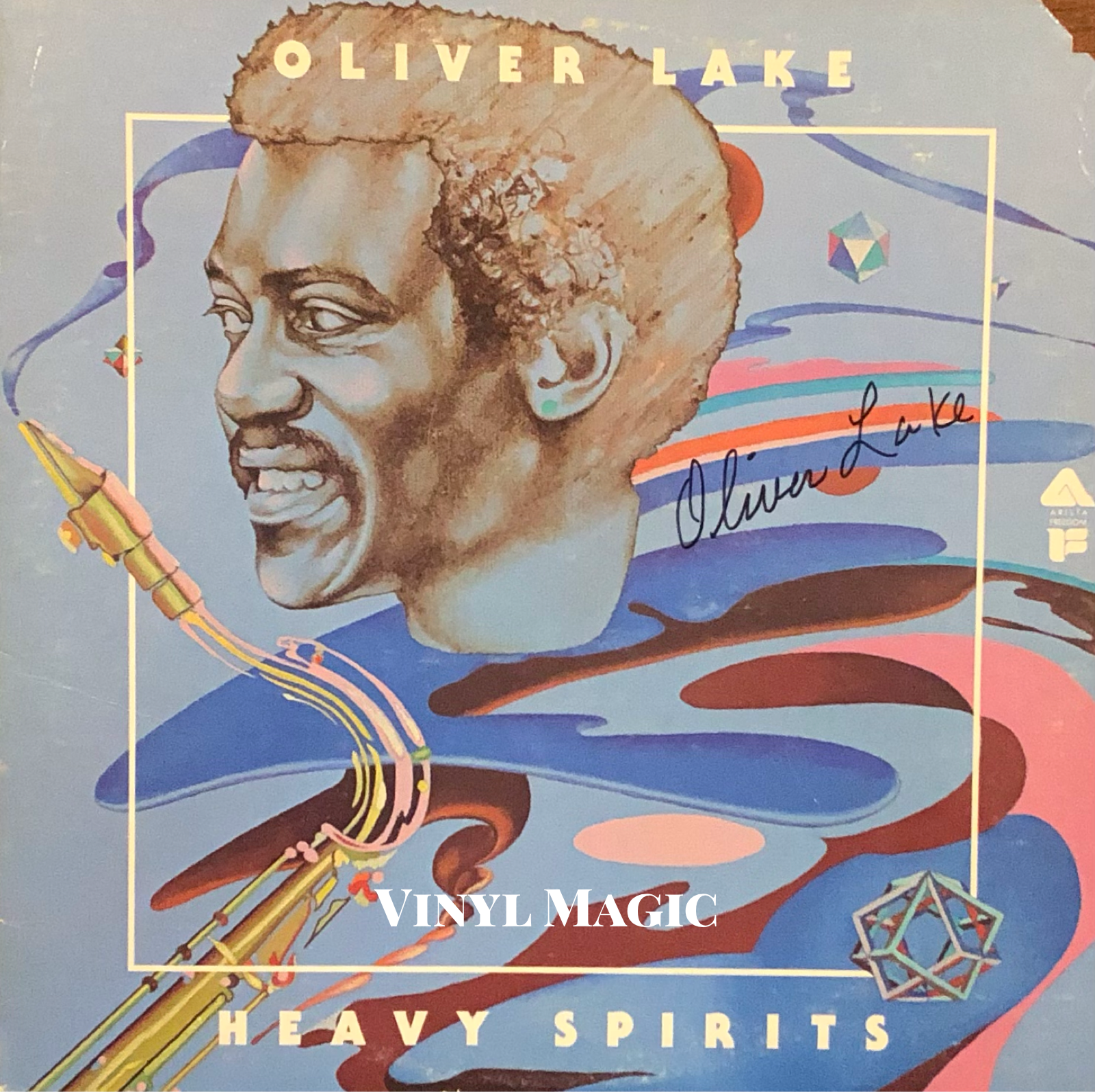John Coltrane, Reggie Workman and Me...
You see, there's something that comes through you when you have developed your being - that you charge your sound with a particular prana, a particular energy that is unique only to yourself. And nobody can sound like that but you, because that is your fiber and transmission. So I think the sound is one of the most important parts of being a musician. And working with young people, I find there are many young people in the school who have tremendous ability to play their instruments and learn all the theory, but they haven't made their own sound. And so I try to help them discover what that is - so they can feel that this is me, this is the sound I want, this is what I want to develop in my musical career. Somehow, they don't think about their personal input to what they're doing. They don't realize that they have their own sound, their own thing to give.
Reggie Workman
Four For Trane (1964) signed by Reggie, Archie Shepp
So you have all kinds of people that you come in contact with: Gigi Gryce, Jackie McLean... My philosophy became that you do the best in every occasion, and it's all about creating a musical dialogue. I want to have the best dialogue I can, just like in spoken conversation. You walk into a room, you don't know who you're going to encounter, it could be anybody. And you're not going to stop talking to someone because they're from a different place than you, you try to find a common thread... I want to be the best I can be at that moment, and maybe there's someone who just wants to play Broadway shows, and they work on just that area. and doing just that is still a helluva feat. But you notice that many of the musicians who came along with me had to do everything - played Broadway shows, played the clubs, played the lofts, and went on the road. They had to be ready. If Miles Davis called me to go on the road, I had to be ready.
Reggie Workman
Karma (1969) signed by Reggie, Billy Hart, Pharoah Sanders
Best known for a stint with his fellow Philadelphian John Coltrane, Reggie Workman is one of the premier jazz bassists of all time. Appearing on hundreds of sessions in his heralded sixty plus year career, Reggie has been the backbone for Art Blakey, Donald Byrd, Herbie Mann, Thelonious Monk, Lee Morgan, Pharoah Sanders, Archie Shepp, Wayne Shorter and so many other acclaimed artists. Appropriately lauded throughout, Reggie received a prestigious Guggenheim Fellowship in music composition in 2020, and he was also named an NEA Jazz Master in 2021, the highest honor that the United States confers upon jazz artists. Though most artists receive these accolades late in their careers as a capstone, Reggie is still a vibrant and creative life force, educating, performing and recording with a ferocity and tenacity that belie his age.
It all began in Philadelphia, as Reggie recalled, "I first started playing in community groups In Philadelphia. My parents recognized my aptitude for music and enrolled me in classes at Gimbels, a local department store in downtown Philly. I studied piano for several years..." A humble beginning and an unusual track, nevertheless Philadelphia was a thriving jazz scene in the 1940s and 1950s, "They called my area of Philly 'brickyard.' Music was everywhere and people came from all over to sit in on jam sessions and enjoy the music. On a given night, you might see Lee Morgan, the Wilson Brothers or Odean Pope. Since Philly was the last stop before New York, I met John Coltrane on several occasions at jams before joining his band. It was an exciting period."
Ugetsu (1963) signed by Reggie, Curtis Fuller, Freddie Hubbard, Cedar Walton
Though he was only with Trane for one year in 1961, his masterful bass playing is evident on Africa/Brass, Live At The Village Vanguard and Ole Coltrane, three classics in the Coltrane canon. From there, Reggie joined one of the finest iterations of Art Blakey's Jazz Messengers with Freddie Hubbard on trumpet, Curtis Fuller on trombone, Wayne Shorter on saxophone and Cedar Walton on piano. With Art at the helm, they were as prolific as they were talented, releasing six albums on Blue Note and Riverside Records within a two year period, creating an enduring legacy of classic hard bop records, including Caravan, Ugetsu and Kyoto.
As Reggie recorded hundreds of sessions with other leading jazz artists, he was steadfast in his commitment to give back to the community which had supported him. In 1970, he co-founded Collective Black Artists to assist musicians, as Reggie remembered, "We as black musicians were not getting work, calls for pit work, calls for orchestra spots, not getting record dates that we needed. We're not going to just lay down and say, 'Nobody will hire us.' We're going to hire ourselves and present our own concerts." It was a selfless act of service which is endemic and possibly unique to jazz artists: they willingly pass on their knowledge and traditions to subsequent generations.
Virgo Vibes (1967) signed by Reggie, Roy Ayers, Charles Tolliver, Buster Williams
Though Reggie was a first call session musician and a fluent hard bop practitioner, he was not content to rest on his laurels. He was equally sought after as a free jazz musician and avant garde composer. A restless sonic explorer with Marion Brown, Marilyn Crispell, Yusef Lateef, Roscoe Mitchell, and Sam Rivers, Reggie appeared on many of their seminal and challenging recordings. Probably his longest tenure, aside from his twenty-five plus years as an educator with The New School in New York City, was his participation with Trio 3, a thirty-five year partnership with the saxophonist/poet Oliver Lake, a founding member of the influential World Saxophone Quartet, and drummer extraordinaire Andrew Cyrille, a colleague for many years with the free jazz piano savant Cecil Taylor. Trio 3, a leaderless trio of extraordinary talent, released more than ten recordings in their storied career.
The Beat Goes On (1967) signed by Reggie
Erin and I were blessed to see Reggie and Trio 3 in one of their last public performances at Dizzy's Club at Jazz at Lincoln Center in New York City on February 6, 2022. The trio had announced their retirement from performances so the excitement was palpable to see these legends at one of their last concerts. Several weeks earlier, Erin and I had bought tickets and we were absolutely giddy as the show approached. The day before the show, Erin spoke with our niece and her husband, music lovers who had recently relocated to Brooklyn from New Orleans to see if they wanted to join us. Unfortunately, the show, touted in the New York Times as a must see, was now sold out. Fortunately, we had a hook in Reggie's niece who is a great friend of ours, so Erin called Gisele and we got the two extra tickets we needed. Thank you Gisele! Thank you Reggie!
Trio 3 with Vijay Iyer, Bruce Williams Dizzy’s Club NYC February 6, 2022
The show did not disappoint. The floor-to-ceiling windows of Dizzy's Club afforded a stunning visual backdrop of Columbus Circle and Central Park amid the swirling intensity of the city below. However, the real action and potency was on stage with the brilliant interplay between these virtuoso musicians. As an added bonus, Trio 3 was augmented by pianist Vijay Iyer and alto saxophonist Bruce Williams, two immensely talented and welcome additions. The show started with just the quartet (sans Oliver Lake), with Reggie anchoring the bottom with his deep and resonant bass. After several sprawling pieces, Oliver joined in the fun, trading solos, squawks, squeals and staccato bursts with fellow saxophonist Bruce Williams. Another highlight was "Refractions - Breaking Glass" featuring a spoken word performance by Oliver Lake that was equally poignant and moving. It was an incredible night, the music, at times, disjointed and dissonant, at others, melodic and soothing fueled by the deeply simpatico and telepathic grooves of Reggie and Andrew. As Reggie once wisely counseled, "The majority of people mistakenly feel like they don't need a live musical experience." Perhaps, there are such unfortunates, happily, Erin and I are not among them.
Reggie digging in with Oliver Lake
After the show, Erin and I visited with Reggie and he was very gracious as he signed some of his vinyl. I told him that I loved his playing on Pharoah Sanders's Karma, "This is a great album, it was a lot of fun to record," he affirmed. 'What was it like playing with (other bassists) Richard Davis and Ron Carter?' I inquired. "Oh, we didn't play together in the studio, that was all done later in mixing," he answered. When he saw the Fredddie Hubbard albums, he smiled, "Wow, I love Freddie, I really miss playing with him." We thanked Reggie for his music and especially his exceedingly cool niece Gisele, and we look forward to new music from this creative juggernaut.
Vijay Iyer, Reggie Workman, Oliver Lake
Reggie Workman, a fearless improviser and an uncompromising artist, endlessly and relentlessly creating, he’s come a long way from Gimbels Department Store. Perhaps his words describe it best, "Those were memorable times, but I don't want to live there. My thoughts are: Okay, that happened and it was good. But my mind is now, what happens tomorrow?" I'm guessing tomorrow there will be more life sustaining music and we can't wait.
Components (1968 recordings, 1980 release) signed by Reggie, Bobby Hutcherson
Choice Reggie Workman Cuts (per BKs request)
https://www.youtube.com/watch?v=_Fz_ZgweERo&list=PLn6hhCaBfMnTZGHyiovYlDL4Jkb4D3vKf
“Song Of The Underground Railroad” Africa/Brass with John Coltrane 1961
https://www.youtube.com/watch?v=mWEvjzbTLR4
“Ole” Coltrane Ole 1961
https://www.youtube.com/watch?v=UjkVMnurFe8
“Ugetsu” with Art Blakey 1963
https://www.youtube.com/watch?v=QZ6lB7FKxi8
“The Creator Has A Master Plan” Karma 1969
https://www.youtube.com/watch?v=2JRb0jYr7oc
“Naima” Four For Trane with Archie Shepp 1964
https://www.youtube.com/watch?v=-l8pkVPYykE
“JuJu” with Wayne Shorter 1965
https://www.youtube.com/watch?v=qMvZ8mehVhM
Trio 3 live at Dizzy’s Club, NYC 2.06.22
https://www.youtube.com/watch?v=1oITDUn70uY
“That Old Feeling” live with Art Blakey, Paris 1963
https://www.youtube.com/watch?v=nQQZX910CrU
“The Beat Goes On” The Beat Goes On with Herbie Mann 1967
https://www.youtube.com/watch?v=-sjZsFZkHu4&list=RD-sjZsFZkHu4&start_radio=1
“Virgo Vibes” Virgo Vibes with Roy Ayers 1967
https://m.youtube.com/watch?v=EBPd7c5Zucg
Live with Mal Waldron, Ed Blackwell
https://m.youtube.com/watch?v=TRU1jTO6NyE
“Softly As In A Morning Sunrise” live in Munich with Eric Dolphy, McCoy Tyner 1961
New Horn In Town (1960) signed by Reggie
Heavy Spirits (1975) signed by Oliver
Jump Up (1982) signed by Oliver
World Saxophone Quartet Plays Duke Ellington (1986) signed by Oliver












